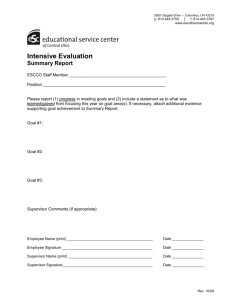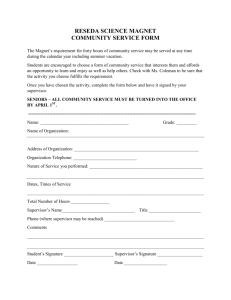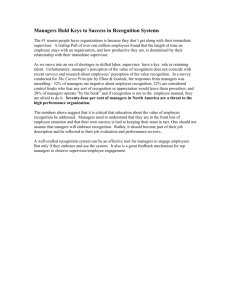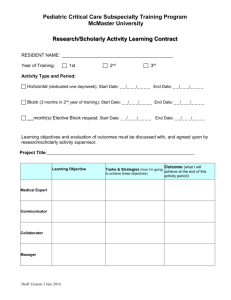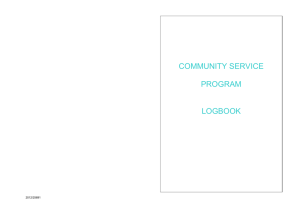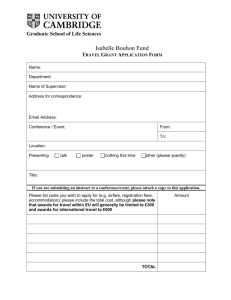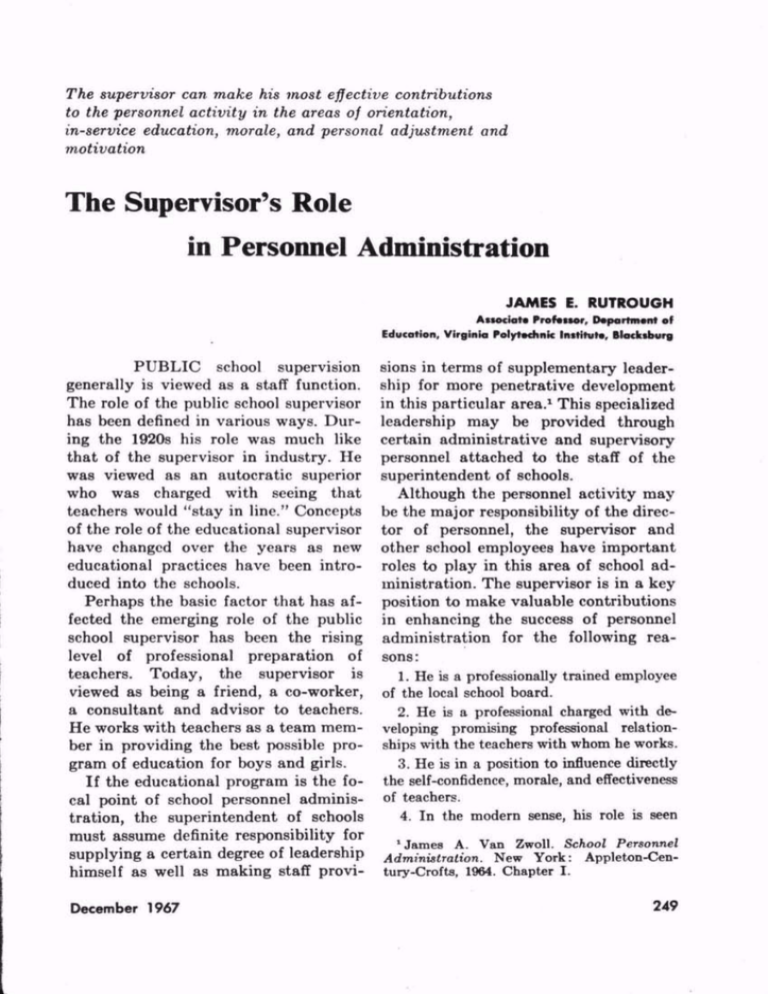
The supervisor can make his most effective contributions
to the personnel activity in the areas of orientation,
in-service education, morale, and personal adjustment and
motivation
The Supervisor's Role
in Personnel Administration
JAMES E. RUTROUGH
Associate Profesior, Department of
Education, Virginia Polytechnic In.tihit., Bladnbwg
PUBLIC school supervision
generally is viewed as a staff function.
The role of the public school supervisor
has been defined in various ways. Dur
ing the 1920s his role was much like
that of the supervisor in industry. He
was viewed as an autocratic superior
who was charged with seeing that
teachers would "stay in line." Concepts
of the role of the educational supervisor
have changed over the years as new
educational practices have been intro
duced into the schools.
Perhaps the basic factor that has af
fected the emerging role of the public
school supervisor has been the rising
level of professional preparation of
teachers. Today, the supervisor is
viewed as being a friend, a co-worker,
a consultant and advisor to teachers.
He works with teachers as a team mem
ber in providing the best possible pro
gram of education for boys and girls.
If the educational program is the fo
cal point of school personnel adminis
tration, the superintendent of schools
must assume definite responsibility for
supplying a certain degree of leadership
himself as well as making staff proviDecember 1967
sions in terms of supplementary leader
ship for more penetrative development
in this particular area.1 This specialized
leadership may be provided through
certain administrative and supervisory
personnel attached to the staff of the
superintendent of schools.
Although the personnel activity may
be the major responsibility of the direc
tor of personnel, the supervisor and
other school employees have important
roles to play in this area of school ad
ministration. The supervisor is in a key
position to make valuable contributions
in enhancing the success of personnel
administration for the following rea
sons:
1. He is a professionally trained employee
of the local school board.
2. He is a professional charged with de
veloping promising professional relation
ships with the teachers with whom he works.
3. He is in a position to influence directly
the self-confidence, morale, and effectiveness
of teachers.
4. In the modern sense, his role is seen
1 James A. Van Zwoll. School Personnel
Administration. New York: Appleton-Century-Crofta, 1964. Chapter I.
249
as that of being a consultant, a helper, a
friend and mutual confidant of the teacher.
5. He is in the position of contributing
to the objective that all school employees
have the competencies needed for their
respective jobs.
6. His work involves providing instruc
tional leadership to enhance quality educa
tion in the school system.
appropriately carried out with the
supervisor as a cooperating team mem
ber. The very nature of supervision in
the modern school system lends itself
to the support of personnel administra
tion in the following areas:
1. Orientation. Beginning teachers and
those new to the school system may
find their adaptation and adjustment to
The supervisor appears to be in a
the new situation eased as a result of
position to contribute to many of the
the work of the supervisor. Many pre
functions of school personnel adminis
liminary and presession orientation
tration.
programs are inadequate at best. Thus
personnel administration, and the
Emerging Role
school system in general, have an ob
of the Supervisor
ligation to conduct a continuing pro
Personnel administration is a rela
gram of orientation as the school year
tively new development in the field of proceeds. The supervisor is called upon
school administration. As school dis to play a major role in this continuing
tricts become larger and more complex, program.
this phase of school administration
Among the activities that may be in
becomes more important and more spe
cluded in such a program, to which the
cialized. In recent years personnel ad supervisor can make excellent con
ministration, which was once the exclu tributions, are the following:
sive job of the superintendent of schools,
1. Arranging for new teachers to observe
has become a partnership arrangement.
demonstrations and teaching by experienced
The assistance of supervisors, princi teachers.
pals, committees of teachers, and others
2. Organizing workshops for beginning
is needed to cope with the personnel ac
teachers and for new teachers that will pro
tivity in the modern school complex.
vide for professional growth and the ex
The literature pertaining directly to change of ideas.
the role of the supervisor in personnel
3. Tours of the school system and the
administration is extremely limited. school community to enable new teachers
Apparently, few studies have been com
to learn more about the community, its
pleted pertaining to the supervisor's school system, its goals, customs, and assets.
role in this area. It seems evident, from
4. Arranging social events to provide
a review of recent literature pertaining opportunities for new teachers to get ac
to the role of the supervisor in the quainted with colleagues, and to provide
modern school organization, that many for an element of recreation. This is also
opportunities exist for the supervisor to helpful in gaining the good will and coopera
make worthwhile contributions to the tion of the new employees.
personnel administration field. It ap
5. Helping new teachers to become famil
pears that many of the functions of iar with the job, and with its problems.
personnel administration may be more
(Continued on page 254)
December 1967
251
(Continued from page S51 )
Much of the supervisory program is
concerned with continuing orientation
activities for both new and experienced
personnel.2
As a specialist in human relations, the
supervisor can smooth the path of
human interaction, ease communica
tion, evoke personal devotion, and allay
anxiety on the part of new teachers. 3
Thus, valuable contributions are made
in enhancing the job performance of
new employees, and in improving in
struction. The supervisor is a logical
supplementary agent in exercising
leadership in the development of a
stimulating atmosphere free from ten
sion for the new employee.4 This is an
important contribution that relates to
several of the principles of personnel
administration.
2. In-service education. Within the
school system all supervision of per
sonnel has the function of providing inservice education that relates to the
objective of promoting and maintain
ing competency.5 This is a basic objec
tive of school personnel administration.
In teaching, it is imperative that the
teacher keep up with the changes in his
teaching field. Regardless of how com
petent beginning teachers may be, the
leadership of the school system has a
responsibility to provide opportunities
for these teachers to continue their
professional growth. This is an objecVan Zwoll, op. tit., pp. 143-49 and 239.
'William H. Lueio and John D. McNeil.
Supervision: A Synthesis of Thought and Ac
tion. New York: McGraw-Hill Book Com
pany, Inc., 1962.
'Edith S. Greer. "Human Relations in Su
pervision." Education 82: 203-206; December
1961.
Van Zwoll, op. cit., p . 87.
254
tive of an efficiently operating school
system. According to Lucio and Mc
Neil,9 the supervisor is generally re
sponsible for six kinds of duties with
reference to in-service education:
1. He plans with individuals and groups
to develop policies and programs in various
academic fields.
2. He makes decisions, coordinates the
work of others, and gives directions.
3. Through conferences and consultations,
he seeks to improve the quality of instruc
tion.
4. He participates directly in the formu
lation of objectives, selection of school ex
periences, preparation of teaching guides,
and in the selection of instructional aids.
5. He gives and arranges for classroom
demonstrations of teaching methods, use
of aids, and other direct help to classroom
teachers.
6. Through systematic surveys, experi
ments, and studies, he explores current con
ditions and recommends changes in prac
tice.
3. Morale. The most important single
factor in getting the best that a school
employee has to offer is how he feels
about his job, his associates on the job,
and the school system in which he is
employed.7 This is one of the principles
of personnel administration that relates
to morale. Actually all personnel in the
school system play roles in facilitating
this process. Morale cannot be created
or guaranteed, but the climate which
favors its development can be created.
Greer" states that one of the important
elements in supervision is the develop
ment of a stimulating atmosphere free
from tension. Therefore, the supervisor
" Lucio and McNeil, op. cit., p. 26.
' Van Zwoll, op. cit., p . 172.
Greer, op. cit., p. 204.
Educational Leadership
occupies a strategic position, as the
friend and confidant of, as well as con
sultant to the teacher, in helping to
create a climate conducive to develop
ment of good morale.
From a personnel administration
point of view, it appears that the de
velopment and maintenance of morale
might be looked upon as developing and
maintaining organizational health.9 In
reality this means taking action to im
prove school employee-job relation
ships. The supervisor can make excel
lent use of his relationships with
teachers in bringing to the attention of
the personnel division those problems,
issues, grievances, and injustices that
need to be corrected to improve the
working situation.
4. Motivation and personal adjust
ment. Implicit in the concept of per
sonal adjustment is the fact that the
satisfaction of individual needs is a con
tinuous process. Supervision contributes
materially to the total administrative
effort to satisfy both organization ex
pectations and the physical and psycho
logical needs of personnel. The super
visor can contribute to the achievement
of these ends by: 10
1. Providing assistance to members of the
school organization in solving problems
with which they are constantly confronted.
2. Helping the organization to decide
whether the individual is capable of fulfill
ing role expectations.
3. Helping the organization to clarify the
position requirements and the qualifications
necessary for successful performance.
4. Assisting in the selection process.
William B. Castetter. Administering the
School Personnel Program. New York: The
Macmillan Company, 1962. p. 80.
"Castetter, op. cit., pp. 65-66.
December 1967
5. Motivating members of the organiza
tion to accept responsibility for self-de
velopment and creativity.
6. Dealing with personnel maladjustment,
which is expressed in such forms as aggres
sion or regression; thus minimizing the ten
sion and strain within the school system.
7. Motivating the teacher to establish
appropriate working relationships with his
colleagues, and to enhance his personal and
professional development.
8. Recommending changes in work assign
ments, dealing with unsatisfactory superiorsubordinate relationships, and providing
assistance to potential retirants.
In summary, personnel administra
tion must increasingly deal with the
complexities of human nature and its
implications for organizational be
havior. The supervisor has an impor
tant role to play in assisting the per
sonnel division in coordinating the
multiplicity of activities involved in its
broad field of operation. The major
concerns of the personnel division are
also areas of interest to the supervisor.
Supervision shares with personnel ad
ministration the basic objectives of
doing whatever is necessary to make
sure that all who work within the
school system have the competencies,
the will, and the working conditions
for providing the best program.
It appears that the supervisor can
make his most effective contributions to
the personnel activity in the areas of
orientation, in-service education, mo
rale, and personal adjustment and mo
tivation. Contrary to the views held
by some authorities in the field of
personnel administration, supervision
is a dynamic, growing process that is
occupying an increasingly important
<Ǥ
role in public education.
255
Copyright © 1967 by the Association for Supervision and Curriculum
Development. All rights reserved.



